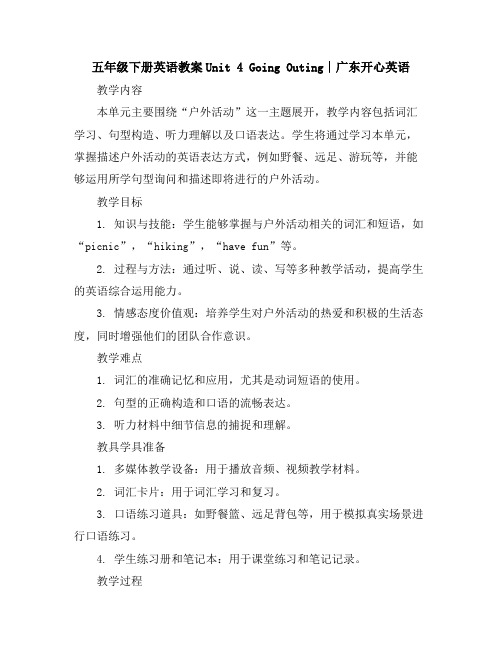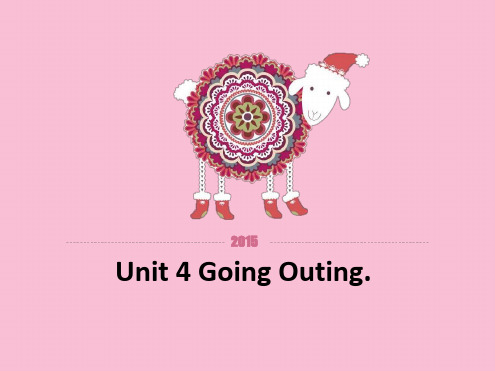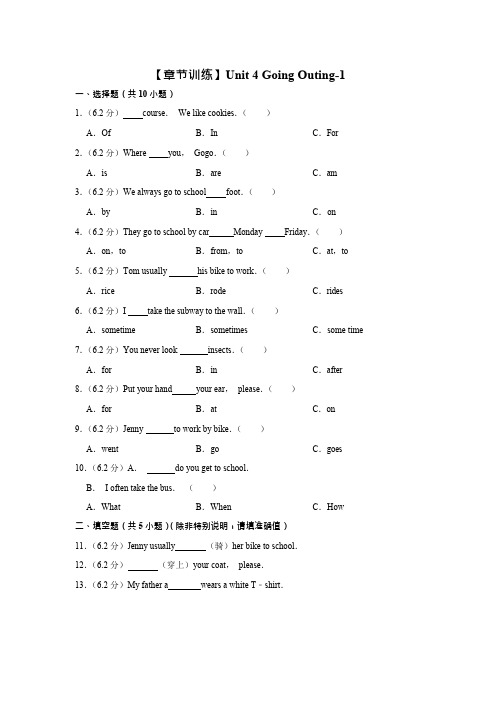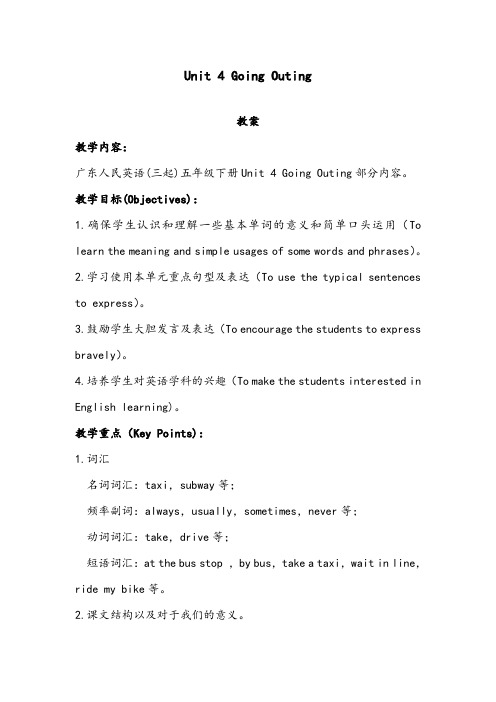【优质】小学开心版英语五年级下册Unit 4 Going Outing 第一课时优质公开课教案
新广州开心版小学英语五年级下册Unit 4《Going Outing》ppt课件2

Sunday MondayTuesday Wednesday Thursday Friday Saturday
×√× √ √ √× usually 通常地
Sunday MondayTuesday Wednesday Thursday Friday Saturday
×√ √ √ √ √ √
often 经常
Sunday MondayTuesday Wednesday Thursday Friday Saturday
√√√ √ √√√
always 总是
Back
Read Quickly
• 快速阅读
Sunday MondayTuesday Wednesday Thursday Friday Saturday
bike
自行车
car
汽车
taxi
出租车
subway
地铁
The End
You did a good job!
Sunday MondayTuesday Wednesday Thursday Friday Saturday
××× × ×××
never
从未
ever
曾经
never
绝不、从来都不
Sunday MondayTuesday Wednesday Thursday Friday Saturday
• How do you get to school? • I ___u_s_u_a_l_ly__ take a b__u_s____.
Sunday MondayTuesday Wednesday Thursday Friday Saturday
√√√ √ √√√
粤人版开心学英语三年级起点小学五年级英语下册教案Unit 4 Going Outing

Unit 4 Going Outing【教学目标】1.确保学生认识和理解一些基本单词的意义和简单口头运用。
2.需要掌握的词组:never,sometimes,usually,always,subway,bus,taxi,bike。
3.学习使用本课重点句型:(1)How do you go to the zoo?(2)Do you usually take a taxi to school?4.鼓励学生大胆发言及表达。
5.培养学生对英文学科的兴趣。
6.增强学生听说读写译的能力。
【教学重点】在学习了单词的基础上,以单词为载体,进行主要句型的学习,并了解其中的语法现象,根据具体情境,学会交流对话,侧重句型语法学习,交际意向和课外拓展为重点。
【教学难点】学生处于小学阶段,对英语有了初步了解,词汇储备较少,对于学生的要求难点是在会读,会说的基础上,能掌握一些基本单词的拼写和造句,了解一定的语法内涵,与人进行简单沟通交流。
【教学方法】1.音频,情景教学法。
2.Pair-work两人小组活动,Group-work小组活动,多媒体辅助教学。
【教学准备】课件、图片素材、音频文件、教学道具。
【教学过程】Step 1.Greeting.教师和学生之间,进行日常口语问候,例如:天气,星期,心情等。
Step 2.Warm-up/Leading.教师通过多媒体教学课件,播放和本次主题有关的图片。
(1)Sometimes I play basketball. I usually run on the playground.______always read books.(2)Do you usually/always/sometimes....?Step 3.Presentation.1.Words Learning.(1)老师放映课件,用中文询问同学看到了什么?同学们会看到课件上呈现的图画。
(2)教师拿出单词卡片,进入重点新词汇学习环节,向同学展示图片,结合PPT上放映的内容,带领同学学习一些新单词。
五年级下册英语课件Unit4GoingOuting1广东开心英语

6.It is like a train but goes under the ground.
subway
How do you go to the zoo?
take the bus
take the plane
take the train
take the subway
take the ship
I never play Mahjong.
Guess the Meaning
Never
0%
Sometimes
50%
Usually
75%
Always
100%
have a picnic; take photos ; play with friends; surf the Internet; read books; go to the library; go to Guangzhou;
go to Guangzhou;
Listen and guess what transportation it is.
car
motorbike bus
train
plane
ship
1.It goes in the water . ship
2.It has two wheels (轮子), you can ride it.
bike
3.It is like a bike but goes much faster.
motorbike
4.It is just like a bird. It can fly in the sky.
plane
5.It’s very long ,it goes more quickly than the car.
五年级下册英语教案-Unit4GoingOuting∣广东开心英语

五年级下册英语教案Unit 4 Going Outing∣广东开心英语教学内容本单元主要围绕“户外活动”这一主题展开,教学内容包括词汇学习、句型构造、听力理解以及口语表达。
学生将通过学习本单元,掌握描述户外活动的英语表达方式,例如野餐、远足、游玩等,并能够运用所学句型询问和描述即将进行的户外活动。
教学目标1. 知识与技能:学生能够掌握与户外活动相关的词汇和短语,如“picnic”,“hiking”,“have fun”等。
2. 过程与方法:通过听、说、读、写等多种教学活动,提高学生的英语综合运用能力。
3. 情感态度价值观:培养学生对户外活动的热爱和积极的生活态度,同时增强他们的团队合作意识。
教学难点1. 词汇的准确记忆和应用,尤其是动词短语的使用。
2. 句型的正确构造和口语的流畅表达。
3. 听力材料中细节信息的捕捉和理解。
教具学具准备1. 多媒体教学设备:用于播放音频、视频教学材料。
2. 词汇卡片:用于词汇学习和复习。
3. 口语练习道具:如野餐篮、远足背包等,用于模拟真实场景进行口语练习。
4. 学生练习册和笔记本:用于课堂练习和笔记记录。
教学过程1. 导入:通过展示户外活动的图片或短视频,引起学生的兴趣,并复习相关的旧知识。
2. 新授:介绍新的词汇和句型,通过图片、实物等直观教具帮助学生理解和记忆。
3. 练习:设计小组活动,让学生在模拟的户外活动场景中使用新学的词汇和句型。
4. 巩固:通过听力练习和口语对话,加深学生对知识点的理解和运用。
板书设计板书将简洁明了地呈现本节课的核心词汇、句型以及重要的语言点。
通过颜色、图表等形式,增强视觉效果,帮助学生记忆和理解。
作业设计1. 词汇填空:要求学生用本课学到的词汇填空,巩固记忆。
2. 句子构造:让学生运用所学句型编写关于户外活动的句子。
3. 口语练习:鼓励学生与家长或同学进行英语对话,分享自己的户外活动经历。
课后反思课后,教师应反思教学过程中学生的参与度、教学效果以及可能存在的问题。
五年级下册英语课件-Unit 4Going Outing1_广东开心英语

Listen and guess what transportation it is.
car
motorbike bus
train
plane
ship
1.It goes in the water . ship
2.It has two wheels (轮子), you can ride it.
I never play Mahjong.
Guess the Meaning
Never
0%
Sometimes
50%
Usually
75%
Always
100%
have a picnic; take photos ; play with friends; surf the Internet; read books; go to the library; go to Guangzhou;
A: How is she going to Guangzhou? ship B:He is going by________.
A: How do you go to Guangzhou? B: I take the bus to Guangzhou.
I go to Guangzhou by bus.
bike
3.It is like a bike but goes much faster.
motorbike
4.It is just like a bird. It can fly in the ong ,it goes more quickly than the car.
train
6.It is like a train but goes under the ground.
五年级下册英语课件 Unit 4 Going Outing 1|广东开心英语共23张

1.take 2.drive 3.taxi 4.subway 5.always ually 7.sometimes 8.never
课下认真朗读本单 元单词及对话!
Thank you !
usually 通常地
eg: They usually finish their work at night.
他们通常在晚上完 成他们的工作。
always
always 总是
eg: He always helps her with her problems.
他总是帮助她解决 问题。
subway
她将乘出租车去学 校。
look for
look for 寻找
eg: What are you looking for? 你在找什么?
Let's Read !
与你的小伙伴一起大声朗读以上单词 互相纠正不良发音习惯 看谁在短时间里记得最快最准确
1.t_ke 2.dr_ve 3.ta_i 4.s_bway 5._lways _ally 7._ometimes 8.ne_er
2015
Unit 4 Going Outing.
never
never 从未
eg: We will never give up! 我们绝不放弃!
sometimes
sometimes 有时
She sometimes stays with her relatives.
她有时和她亲戚住 在一起。
usually
subway 地铁
eg: I always go to the park by subway.
我总是ቤተ መጻሕፍቲ ባይዱ地铁去公 园。
taxi
taxi 出租车
新开心英语五年级下册Unit4 Going Outing

F
T T
wait in line say “Excuse me.” give your seat to elderly people
push jump rush to get a seat
al /ɔ: /
谈话
走
总是
球
高的
小的
地铁在世界各地有不同的名字。让我们来看看它们是什么。 我住在伦敦。 我总是搭地铁上学。 我来自上海。 我通常搭地铁上学。 我有时在纽约搭地铁。
在香港,我们总是把地铁叫做MTR。(Mass Transit Railway ) 在新加坡,我们通常把地铁叫做MRT。
(Mass Rapid Transit )
MTR underground subway metro MRT
卡车
摩托车
渡船
直升飞机
ferry
motor
bike
helicopter
truck
外出
在外面的森林里……
我们在森林里。
一起寻找一些小鸟吧。
我从来不找小鸟。
我通常寻找糖果!
糖果!你通常找得到一些糖果吗?
当然!我总是能找到一些糖果!
啊,果果,我们在哪里?
我们迷路了。
但是我有一些糖果。
噢,果果。
从未
地铁
I never take a subway to school.
我从未搭地铁去上学。
你怎样去动物园?
我通常搭公共汽车去。
你通常搭出租车去学校吗?
不!我从未搭出 租车去学校。
在汽车站
这是汽车站。 记住,始终排队等车,不能推。
好的,妈妈。我记住了。 有时车上有老人和小孩。 请让座给这些人。 好的,妈妈。但是看那个男 人。 他挤到队伍的前面。 打扰了。请排队。
五年级下册英语优质教案-Unit 4 Going Outing(含5课时) 广东开心英语

Unit 4 Going Outing一、Teaching Contents:1. Vocabulary: never sometimes usually always subway bus taxi bike2. Drills: How do you get to school? I usually take the bus.Do you usually take a taxi to school? No! I never take a taxi to school. They are on the desk now.3. Sounds and words: /ɔ:/ / talk , walk , always , ball , tall , small .二、Teaching Aims:1. Master the vocabulary in four skills.2. Express the drills.3. Master Sounds and Words.4. Can read and understand reading and writing, can understand traffic rules.三、Teaching Focus:1. Vocabulary in four skills.2. Drills of the Target languages .四、Teaching Difficult Point:1. Drills of the Target languages.2. Using the languages in communication. Reading and understanding五、Teaching Periods: 5 periodsThe 1st Period计划授课时间:Teaching Contents:1. Vocabulary: never sometimes usually always subway bus taxi bike2. Drills: How do you get to school? I usually take the bus.Do you ever take a taxi to school? No! I never take a taxi to school.3. Do Practice 1.Teaching Aims:1. Master the vocabulary in four skills.2. Master the drills in four skills.Teaching focus: vocabulary and drillsTeaching Difficult Point: the drillsTeaching Tools: cards, picturesTeaching procedure:一、RevisionRevise the vehicle we learn in Unit 2 .二、Presentation1. T: How do you get to school?S: I walk to school.T: I usually get to school. ( lead Ss to know “usually”)2. Use the cards to teach the new words .I always ride a bike to school.Lead Ss know the meanings of the new words from the sentences.(After that teach the phrases:take a taxi \take a car\ ride a bike \take a subway)②Write on the board:How do you get to school?I usually take the bus.③ Read together and group by group④Ask and anwser in pairs then check .⑤ T: How does she get to school?S: She usually takes a bus to school.T: Do you ever take a taxi to school?S: No ! I never take a taxi to school.三、Practice 1 (Page 11)四、Consolidation1. Have Ss try to recite the vocabularies2. Listen and repeat the Target .3. Do exercise: Look and writetake a bus take a subway ride a bike walk五、Homework:Copy the new words and sentences.Rev ise the Target六:板书设计:The second period计划授课时间:Teaching Contents: Story , Practice 2 and Song activity .Teaching Aims:1. Master the Story in reading.2. Listening comprehension3. Writing down the vehicle .Teaching focus: Read the Story and answer the questionsTeaching Difficult Point: Talking about : How does sb go to school ?Teaching Tools: cards, tapeTeaching procedure:一、Revision1. Show the cards and revise the words : never , sometimes , usually , always .2. Talking about how to go to school .二、Presentation1. Listen the tape and try to know the story .2. Listen again and find out the new words .3. Teach the new words : woods, look for= find, candy( candies) , lost .4. Listen and repeat .5. Answer the questions :Where are they ? / What are they doing ? / Does Gogo usually find some candies ?6. Role reading .7. Try to use the key words to complete the story , then check .三、Practice 21. T give out an example : How does Jenny go to school ? She usually take a bus .2. Have Ss ask and answer in group .四、Song activity : Listen , write and sing .五、HomeworkCopy and recite the Story .板书设计:The third period计划授课时间:Teaching Contents: Sounds and words and Activity .Teaching Aims:1. Master the sound/ɔ:/ / talk , walk , always , ball , tall , small .2. Can reading the chantTeaching focus:1. Sounds and words /ɔ:/ / talk , walk , always , ball , tall , small .2. Reading sentencesTeaching Difficult Point: List the other wordsTeaching Tools: radioTeaching Procedure:一、Revision1、Retell the story .2、Ask and answer questions .二、Activity1、The teacher give out an example .2、Let Ss ask , answer and draw .3、Ask someone to show the result .三、Sounds and Words1、Have read the words corretly and think of their same sound.2、Tell Ss “al” usually prounuce /ɔ:/ / .3、Read after the tape .4、L ook at the teacher’s mouth and guess the words.5、Say more words that have /ɔ:/ / , such as : fall , baseball , basketnall , all ect.四、Listen and chant1、Read the chant loudly .2、Chant after the tape for three times.3、Chant it by themselves .五、Homework:Read the words and copy Activity六、板书设计:The fourth period计划授课时间:Teaching Contents: Reading and writing.Teaching Aims:1、Master the main content of Reading and writing.2、Do the practice .Teaching focus: Read the Story and do the practiceTeaching Difficult Point:Talking about how to do Reading and writing.Teaching Tools: radioTeaching Procedure:一、Revision1.Revise the sound of “al” and read the words in Sounds and words .2. Chant .二、 Presentation1、Look, listen and read ,then answer: Where are Xiaoqiang and his mother? What should Xiaoqiang remember ?2、Listen and check the answer .3、Lead Ss try to know the dialogue .4、Do the exercise 2 : Read again and write T for true and F for false.5、Check the answer.6、Do the exercise 3 : Read the words and phrases ,then put them ioto the correct column .三、Practice1、Read the dialogue .2、Listen to the tape and repeat.3、Try to understand the main content of the dialogue.四、Sum up五、Homework: Read the dialogue and copy the words and phrases in exercise 3.六、板书设计:The 5th Period计划授课时间:Teaching Contents: More reading and writingTeaching Aims:1、Master the main content of the more reading and writing.2、Do the practiceTeaching focus: Read the sentences and do the practiceTeaching Difficult Point:Talking about how to do the More reading and writing. Teaching Tools: pictures , radioTeaching Procedure:一、RevisionShow the pictures and revise the vehicle .二、Presentation and Practice1、T: There are different names for the subway all over the world . Today let’s see what they are .2、Look, listen and read for twice .3、Try to finish Exercise 2 .4、Help Ss to know the meaning of the short passages.5、Listen and repeat .6、Check the answer for Exercise 2 .7、Look and match .8、Teach the new names of the vehicle in Exercise 49、Look at the pictures . Match them with the words below .三、Sum up四、Homework: Read the passages.五、板书设计:教学反思:第一课时教学目标1.复习1~3单元的四会单词和短语:play ping-pong, go swimming, pick apples, go shopping, play basketball, go on a picnic, go to work, eat breakfast, eat lunch, eat dinner, cook dinner, go to bed。
五年级下册英语教案-Unit4GoingOuting-广东开心英语

五年级下册英语教案Unit 4 Going Outing广东开心英语教学内容本单元主要围绕“户外活动”这一主题展开,通过学习,学生能够掌握描述户外活动的相关词汇和句型,如“go camping”, “havea picnic”, “play soccer”等。
教学内容包括听力练习、口语表达、阅读理解和写作练习。
教学目标1. 知识目标:学生能够听懂、会说、会读本单元的生词和重点句子,能够用英语描述不同的户外活动。
2. 能力目标:学生能够在真实情境中运用所学知识进行交流,提高英语听说能力。
3. 情感目标:通过学习户外活动的相关内容,激发学生对大自然的热爱,培养合作精神。
教学难点1. 正确运用一般将来时描述未来的户外活动计划。
2. 词汇的记忆和使用,特别是不同户外活动的表达方式。
教具学具准备1. 教学录音机、PPT课件。
2. 生词卡片、图片。
3. 学生手册、练习册。
教学过程1. 导入:通过展示户外活动的图片,引导学生回顾已知的户外活动词汇,为新课的学习做好铺垫。
2. 新课展示:使用PPT展示本节课的重点词汇和句型,通过听录音、跟读、模仿等方式,让学生掌握新知识。
3. 小组活动:学生分组讨论,用英语描述自己最喜欢的户外活动,并准备进行课堂展示。
4. 课堂展示:每组派代表进行展示,其他学生认真听并给予评价。
5. 巩固练习:通过完成练习册上的相关练习,巩固所学知识。
板书设计板书将围绕本节课的重点词汇和句型进行设计,通过图表、颜色等方式,使板书内容清晰、易于理解。
作业设计1. 书面作业:完成练习册上的相关练习。
2. 口头作业:回家后,用英语向家长描述自己最喜欢的户外活动。
课后反思通过本节课的学习,学生能够掌握描述户外活动的相关词汇和句型,并能够在真实情境中进行运用。
在教学过程中,要注意关注每个学生的学习情况,及时给予指导和帮助,确保每个学生都能够跟上课程的进度。
同时,也要注意培养学生的合作精神和自主学习能力,提高他们的英语学习兴趣。
广东版开心学英语五年级下册Unit 4《Going Outing》公开课课件

•I usually take the bus.
我通常搭乘公共汽车。
看图练习
•How do you get to school? •I usually take a _____s_u_b.way
看图练习
•How do you get to school? •I usually take a _____b_u_s.
Sunday MondayTuesday Wednesday Thursday Friday Saturday
×√× √ ×√× sometimes 有时候
Sunday MondayTuesday Wednesday Thursday Friday Saturday
×√× √ √ √× usually 通常地
Back
Read Quickly
• 快速阅读
Sunday MondayTuesday Wednesday Thursday Friday Saturday
××× × ×××
never
从未
Sunday MondayTuesday Wednesday Thursday Friday Saturday
√√√ √ √√√ always 总是
Back
Bonus
• drive
驾驶
• I can drive a car.
• walkຫໍສະໝຸດ 行走• I walk to school everyday.
• ride my bike 骑自行车
• I ride my bike on weekends.
Target 目标句型 •How do you get to school?
×√ √ √ √ √ √
2019年广东开心版英语五年级下册 unit 4 going outing附答案

【章节训练】Unit 4 Going Outing-1 一、选择题(共10 小题)1.(6.2 分)course.We like cookies.()A.Of B.In C.For 2.(6.2 分)Where you,Gogo.()A.is B.are C.am 3.(6.2 分)We always go to school foot.()A.by B.in C.on 4.(6.2 分)They go to school by car Monday Friday.()A.on,to B.from,to C.at,to 5.(6.2 分)Tom usually his bike to work.()A.rice B.rode C.rides 6.(6.2 分)I take the subway to the wall.()A.sometime B.sometimes C.some time 7.(6.2 分)You never look insects.()A.for B.in C.after 8.(6.2 分)Put your hand y our ear,please.()A.for B.at C.on 9.(6.2 分)Jenny to work by bike.()A.went B.go C.goes 10.(6.2 分)A.do you get to school.B.I often take the bus.()A.What B.When C.How 二、填空题(共5 小题)(除非特别说明,请填准确值)11.(6.2 分)Jenny usually (骑)her bike to school.12.(6.2 分)(穿上)your coat,please.13.(6.2 分)My father a wears a white T﹣shirt.14.(6.2 分)Did you ever take in Guangzhou,Tony?15.(6.2 分)I n take a taxi to school.三、阅读理解(共1 小题)(选答题,不自动判卷)16.(7 分)Hello,I am Fiona.I live in the north China.I like spring,because it is warm.We usually take a bus to the park.I can go hiking and fly kites there.Summer is hot,but it's my favorite season.I can swim with my parents.My father usually drives us to the beach.In fall,it's sunny and cool.I often ride a bike to the nature park with my classmates.It's good exercise.We usually climb mountains and sometimes have a picnic there.In winter,it's cold and snowy.I like making snowmen with my friends at school.I often walk to school.My home is near.(1)Fiona's favorite season is .(2)Fiona often to school.(3)Fiona and her classmates often and in fall.(4)In summer,Fiona can with her .(5)Fiona likes in winter.【章节训练】Unit 4 Going Outing-1参考答案与试题解析一、选择题(共10 小题)1.(6.2 分)course.We like cookies.()A.Of B.In C.For【分析】当然.我们喜欢面条.【解答】考查介词的辨析.of course 是固定搭配,表示当然的意思,放在句子中意思也通.故选:A.【点评】注意联系上下文,正确使用介词.2.(6.2 分)Where you,Gogo.()A.is B.are C.am【分析】你在哪里,Gogo?【解答】本题考查系动词.根据"Where you,Gogo(你在哪里,Gogo)",可知句子叙述一件事实,所以时态用一般现在时,主语是复数,be 动词用are.故选:B.【点评】识记主谓一致的原则,结合题干信息作答.3.(6.2 分)We always go to school foot.()A.by B.in C.on【分析】我们总是走路去上学.【解答】考查方式介词.出行的方式用by+交通工具来表示,但是走路则不一样,用on foot 来表示.故选:C.【点评】出行的方式用步行的,用on foot 来表示.4.(6.2 分)They go to school by car Monday Friday.()A.on,to B.from,to C.at,to【分析】他们从星期一到星期五去上学都是乘坐小汽车.【解答】考查介词的辨析.句子末尾的时间是星期一和星期五,表示连续性,连接这两个单词的固定搭配是用from…to…故选:B.【点评】熟记from…to…的用法.5.(6.2 分)Tom usually his bike to work.()A.rice B.rode C.rides【分析】汤姆通常骑自行车上班.【解答】考查动词第三人称单数,从usually 判断句子使用一般现在时,主语是单数,谓语动词用第三人称单数形式.故选:C.【点评】动词第三人称考查,要求熟悉句子结构,掌握句子意思,结合语法知识进行,辨析选项,确定答案,完成题目.6.(6.2 分)I take the subway to the wall.()A.sometime B.sometimes C.some time【分析】我有时乘地铁去城墙.【解答】考查副词的用法.sometime 某个时候;sometimes 有时;some time 经过若干时间.根据I take the subway to the wall.可知我有时乘地铁去城墙.故选:B.【点评】对副词的基本用法的考查.一般来说在很多情况下,副词放在被修饰的动词后面或句末.但有时也放在主语后面,谓语动词前面.要根据副词的不同种类正确使用.7.(6.2 分)You never look insects.()A.for B.in C.after【分析】你从没寻找过昆虫.【解答】考查介词搭配,句子表示"你从没寻找过昆虫";"look for"表示"寻找";"look in"表示"蔑视,看不起";"look after"表示"照顾,照看",结合要求,完成题目.故选:A.【点评】介词搭配考查,要求熟悉课本所学词汇,短语,结合句子意思,进行辨析选项,确定答案,完成题目.8.(6.2 分)Put your hand your ear,please.()A.for B.at C.on【分析】请把你的手放在耳朵上.【解答】考查地点介词.根据句子意思,是把手放在耳朵上,在…上面,用on 来表示.故选:C.【点评】熟记常用介词的用法.9.(6.2 分)Jenny to work by bike.()A.went B.go C.goes【分析】珍妮骑自行车去上班.【解答】该题考查动词的第三人称单数."Jenny to work by bike"句意是珍妮骑自行车去上班,是一般现在时;A.went 去,go 的过去式;B.go 去,动词原形;C.goes 去,go 的第三人称单数形式;主语Jenny 是第三人称单数,谓语动词用goes;选项C 与句子时态一致.故选:C.【点评】一般现在时表示经常性或习惯性的动作,或表示现在的特征或状态;主语是第三人称单数时,注意谓语动词的变化.10.(6.2 分)A.do you get to school.B.I often take the bus.()A.What B.When C.How【分析】你经常怎么样到学校?我经常乘坐公交车.【解答】考查疑问词辨析,句子表示"你经常怎么样到学校?我经常乘坐公交车";"take the bus"表示"乘坐公交车";用询问交通方式的疑问词进行询问,A.What 什么,不符合题意;B.When 什么时候,不符合题意;C.How 怎么样,符合题意.故选:C.【点评】疑问词辨析考查,要求熟悉课本所学词汇短语,掌握句义,结合语法知识进行辨析选项,确定答案,完成题目.二、填空题(共5 小题)(除非特别说明,请填准确值)11.(6.2 分)Jenny usually rides (骑)her bike to school.【分析】詹妮通常骑自行车上学.【解答】该题考查翻译填空.从usually 判断句子使用一般现在时的,主语是单数,谓语动词用第三人称单数形式,ride,动词,骑.故填rides.【点评】熟记常见的四会单词,注意句子的正确书写.12.(6.2 分) Put on (穿上)your coat,please.【分析】请穿上你的外套.【解答】该题考查翻译填空."穿上"译为put on,该句为祈使句,句首用动词原形.故填:Put on.【点评】解答该题的关键是识记积累常用的单词以及短语,注意词语的适当形式.13.(6.2 分)My father a lways wears a white T﹣shirt.【分析】我父亲总是穿着白色的T 恤衫.【解答】本题考查首字母填空.如果不考虑所填单词,原句是一个完整的句子,由此判断所填单词应是修饰动词的副词.根据wears,再结合字母"a",可知应是always.是副词,表示"总是".符合句意.故填:always.【点评】做题时,首先根据了解句意,然后判断所填单词的词性,再结合所给字母选择合适的单词.14.(6.2 分)Did you ever take a taxi in Guangzhou,Tony?【分析】托尼,你在广州曾经打过车吗?【解答】该题考查看图完成句子.图示为以来出租车.推测句意:托尼,你在广州曾经打过车吗?"打车"译为take a taxi.故填:a taxi.【点评】理解图示含义,结合题干信息作答.15.(6.2 分)I n ever take a taxi to school.【分析】我从来没有乘坐过出租车去学校.【解答】考查首字母填空.根据题干不完全信息得知句意为:我…乘坐过出租车去学校.结合题干要求及常识可知此处填频度副词never 最符合语境,首字母已给出,故填:ever.【点评】注意增加词汇量的积累和常识以及单词用法的积累.三、阅读理解(共1 小题)(选答题,不自动判卷)16.(7 分)Hello,I am Fiona.I live in the north China.I like spring,because it is warm.We usually take a bus to the park.I can go hiking and fly kites there.Summer is hot,but it's my favorite season.I can swim with my parents.My father usually drives us to the beach.In fall,it's sunny and cool.I often ride a bike to the nature park with my classmates.It's good exercise.We usually climb mountains and sometimes have a picnic there.In winter,it's cold and snowy.I like making snowmen with my friends at school.I often walk to school.My home is near.(1)Fiona's favorite season is summer .(2)Fiona often walks to school.(3)Fiona and her classmates often climb mountains and have a picnic in fall.(4)In summer,Fiona can swim with her parents .(5)Fiona likes making snowmen in winter.【分析】你好,我是菲奥娜.我住在中国北部.我喜欢春天,因为它很温暖.我们通常坐公共汽车去公园.我可以在那远足和放风筝.夏天很热,但是那是我最喜欢的季节.我可以和我的父母一起游泳.我爸爸经常开车送我们去海滩.秋天,天气晴朗凉爽.我经常和同学一起骑自行车去自然公园.这是很好的锻炼.我们通常爬山,有时在那里野餐.冬天,天气寒冷多雪.我喜欢在学校和朋友堆雪人.我经常步行去学校.我家就在附近.【解答】本题考查细节理解.1.summer.根据文中"Summer is hot,but it's my favorite season."(夏天很热,但是那是我最喜欢的季节),可知菲奥娜最喜欢的季节是夏天,故答案为:summer.2.walks.根据文中"I often walk to school.(我经常走路去学校)",可知菲奥娜经常走路去学校,一般现在时中,由于主语是第三人称单数,谓语动词也要用单数形式walks,故答案为:walks.3.climb mountains;have a picnic.根据文中"In fall…We usually climb mountains and sometimes have a picnic there."(在秋天…我们通常爬山,有时在那里野餐),可知菲奥娜和她的同学经常在秋天爬山和野餐,故答案为:climb mountains;have a picnic.4.swim;parents.根据文中"Summer is hot…I can swim with my parents."(夏天很热…我可以和我的父母一起游泳),故答案为:swim;parents.5.making snowmen.根据文中" In winter,it's cold and snowy.I like making snowmen with my friends at school."(冬天,天气寒冷多雪.我喜欢在学校和朋友堆雪人),可知菲奥娜喜欢在冬天堆雪人,故答案为:making;snowmen.【点评】做题前,先认真阅读文章弄懂文章的大意,填空时,找到关键句中的关键句词或词组,并根据语法填写单词或词组的正确形式.。
【优质】小学开心版英语五年级下册Unit 4 Going Outing 优质公开课教案

Unit 4 Going Outing教案教学内容:广东人民英语(三起)五年级下册Unit 4 Going Outing部分内容。
教学目标(Objectives):1.确保学生认识和理解一些基本单词的意义和简单口头运用(To learn the meaning and simple usages of some words and phrases)。
2.学习使用本单元重点句型及表达(To use the typical sentences to express)。
3.鼓励学生大胆发言及表达(To encourage the students to express bravely)。
4.培养学生对英语学科的兴趣(To make the students interested in English learning)。
教学重点(Key Points):1.词汇名词词汇:taxi,subway等;频率副词:always,usually,sometimes,never等;动词词汇:take,drive等;短语词汇:at the bus stop ,by bus,take a taxi,wait in line,ride my bike等。
2.课文结构以及对于我们的意义。
在学习了单词的基础上,以单词为载体,进行主要句型的学习,根据具体情境,学会交流对话,侧重句型学习,交际意向和课外拓展为重点。
A: How do you go to ...?B: I take... /by...情感、策略、文化意识目标:1.通过本课学习了解基本句型的用法。
2.可以用本句型表达生活中的一些常见用语。
教学方法:游戏,音频,情景教学法,Pair-work两人小组活动,Group-work小组活动,多媒体辅助教学。
教学难点:学生处于小学阶段,对一些事物的认知尚且模糊,对部分单词的感知和理解可能存在问题,对于五年级下学期学生的要求重点是会读会说,敢于模仿表达,其次能掌握一些基本单词的拼写和造句,在此基础上与人进行简单沟通。
2018-2019年开心版英语小学五年级下册Unit 4 Going Outing 第一课时优质课教案

(2)What does Gogo usually look for?
2. After watching, guide the students to answer the questions.
3. Listen to the tape and read after the tape.
新开心版小学英语集体备课教案
年级:五年级科目:英语编号:16
主备教师
辅备教师
课题
Unit 4 Going Outing(第一课时)
教
学
目
标
知识与技能
1.学会Vocabulary的4个频率副词和4种交通工具。
2.学习Target。
3.学会歌曲Every day I take the bus
过程与方法
通过介绍Tony,Jenny,Gogo和Ben如何上学引出新词。
2. Ss follow the tape to sing the song.
3. After practicing several times,Ss sing together.
4. Ask the Ss to finish the lyrics.
5. Check the lyrics.
V. Homework
4. Analyze the sentences about the Story. Then pay attention to the key words.
5. Ask the students to read the Story in groups.
6. They’re lost. Guide the students to think how to help
- 1、下载文档前请自行甄别文档内容的完整性,平台不提供额外的编辑、内容补充、找答案等附加服务。
- 2、"仅部分预览"的文档,不可在线预览部分如存在完整性等问题,可反馈申请退款(可完整预览的文档不适用该条件!)。
- 3、如文档侵犯您的权益,请联系客服反馈,我们会尽快为您处理(人工客服工作时间:9:00-18:30)。
(2)What does Gogo usually look for?
2. After watching, guide the students to answer the questions.
3. Listen to the tape and read after the tape.
How does Tony/ Jenny / Ben / Lisa go to school?
2. Ss follow the tape to sing the song.
3. After practicing several times,Ss sing together.
4. Ask the Ss to finish the lyrics.
5. Check the lyrics.
V. Homework
mate.
III. Practice (Page 47)
1. T: How does Tony get to school? Does he ever take a taxi to school?
Let’s listen to the tape, then answer my questions.
2. Let’s listen to the tape.
3.Listen to the tape and check the answer.
4.Listen again.
IV. Practice 2 (Page 48)
1.T:How does Tony go to school?
S1: He always takes a bus.
2. Ss practice in groups:
新开心版小学英语集体备课教案
年级:五年级科目:英语编号:16
主备教师
辅备教师
课题
Unit 4 Going Outing(第一课时)
教
学
目
标
知识与技能
1.学会Vocabulary的4个频率副词和4种交通工具。
2.学习Target。
3.学会歌曲Every day I take the bus
过程与方法
通过介绍Tony,Jenny,Gogo和Ben如何上学引出新词。
年级:五年级科目:英语编号:17
主备教师
辅备教师
课题
Unit 4 Going Outing(第二课时)
教
学
目
标
知识与技能
1.学会Story的对话。
过程与方法
观看视频,回答问题,从而学习课文对话。
情感态度
和价值观能熟练运用频率来自词表达自己的日常生活。教学重点
Story的对话。
教学难点
look for与find的区别。以及woods等生词。
S1:…….
II. Presentation (Page 47)
1.T:Gogo never takes a subway to school.(教学never和subway)
2.T:Jenny sometimes takes a car to school.
(教学sometimes和a car)
3.T:Tony usually takes a taxi to school.
情感态度
和价值观
让学生使用频率副词描述自己的生活。
教学重点
Vocabulary的4个频率副词:never,sometimes,usually,always,和4种交通工具:subway,a car,a taxi,a bike。
教学难点
频率副词的使用
教具准备
PPT
课时
1
教学过程
备注
I.Warm-up
1. Free talk:T: How do you go to school?
4. Analyze the sentences about the Story. Then pay attention to the key words.
5. Ask the students to read the Story in groups.
6. They’re lost. Guide the students to think how to help
教具准备
PPT
课时
2
教学过程
备注
I. Warm-up
1. Sing the song:Every day I take the bus
2. Free talk:
T: How do you go to school?
S1:…….
II. Presentation (Page 46)
1. Watching the flash and find out the answer :
3. Have some Ss to answer my questions.
4. Ss read after the tape.
5. Ss practice the dialogue, then read together.
IV. Chant activity (Page 52)
1.Ask the Ss to listen to the song:Every day I take the bus
1.Copy the vocabularies.
2. Read the Target.
板
书
设
计
Unit 4 Going Outing
4个频率副词:never,sometimes,
usually,always,
4种交通工具:subway,a car,
a taxi,a bike
教
学
反
思
新开心版小学英语集体备课教案
(教学usually和a taxi)
4.T:Ben always rides a bike to school.
(教学always和a bike)
5.Ss follow the tape to read all the words.
6. T:Now talk about how you go to school with your desk
them, then play a game to fill in the blanks and find out the exit .
III. Practice 1 (Page 48)
1.Ask the Ss to read the questions first.
2.Ask the Ss to tell about each picture.
